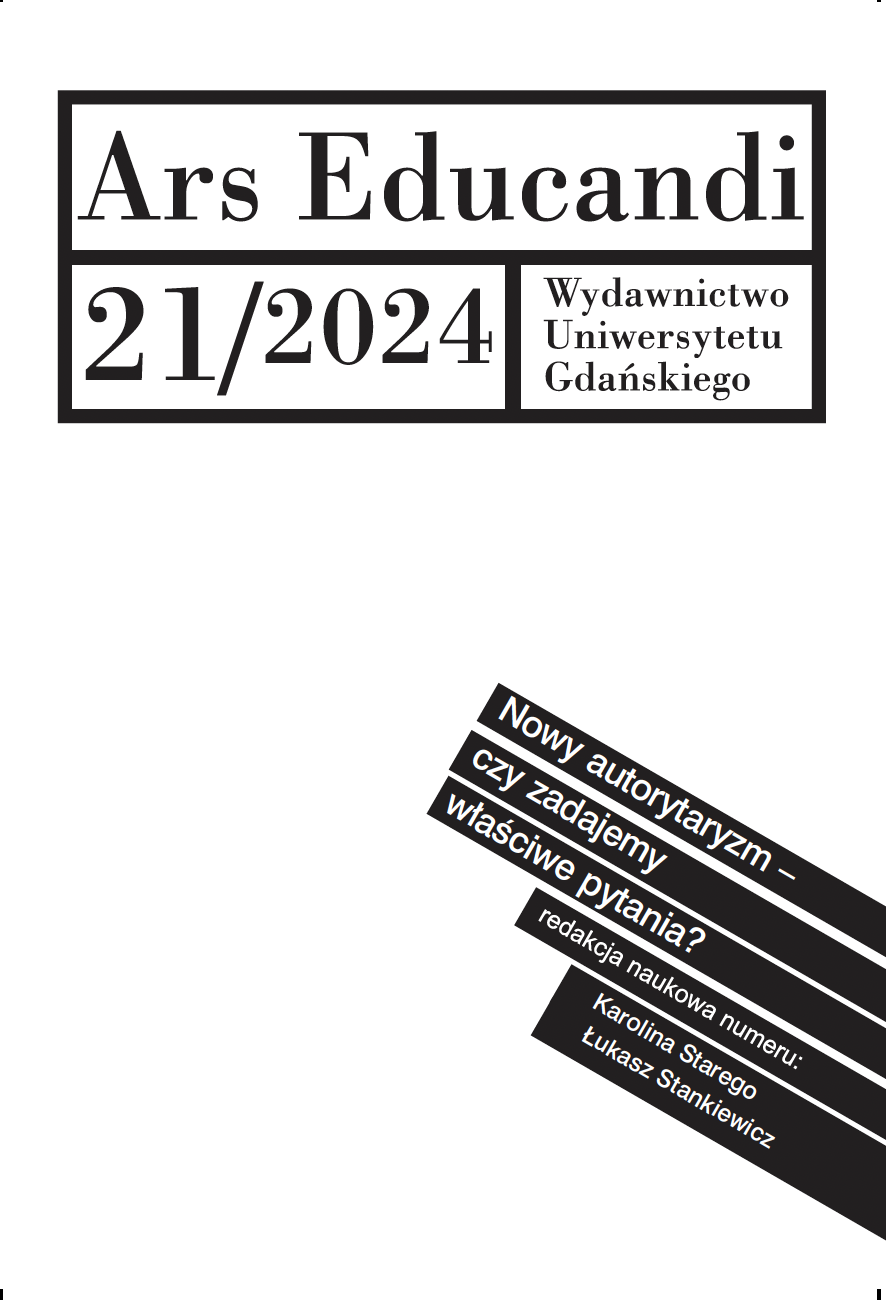Schizmogeneza a autorytaryzm
Poszukiwania dźwigni zmian w książce „Narodzimy wszystkiego. Nowa historia ludzkości” Davida Graebera i Davida Wengrowa
DOI:
https://doi.org/10.26881/ae.2024.21.04Słowa kluczowe:
schizmogeneza, wiedza rdzennych ludów, autorytaryzm, dekolonizacja, pedagogika krytycznaAbstrakt
Artykuł koncentruje się na potencjalnym wpływie książki "Narodzimy wszystkiego. Nowa historia ludzkości," napisanej przez antropologa Davida Graebera i archeologa Davida Wengrowa, na myślenie pedagogów. Książka ta kwestionuje istniejące mity dotyczące rozwoju społeczeństwa i nierówności społecznych oraz stanowi syntezę wyników badań naukowych. Autorzy przekształcili pierwotny plan napisania pamfletu na temat współczesnych nierówności w obszerną książkę. Książka analizuje, jak Europa zaczęła badać kwestie nierówności i ich genezy, i posługuje się przy tym pojęciami, które można wykorzystać do opisania współczesnego dryfowania niektórych państw w kierunku autorytaryzmu.
Downloads
Bibliografia
Bateson, G. (1935). Culture Contact and Schismogenesis. Man, 35, 178–183.
Chadwick, H. M. (2010). The Heroic Age. Cambridge University Press.
de Grafigny, F. (2009). Letters of a Peruvian woman (J. Mallison (red. i tłum.)). Oxford University Press.
Graeber, D. (2018). Dług. Pierwsze pięć tysięcy lat (B. Kuźniarz (tłum.)). Wydawnictwo Krytyki Politycznej.
Graeber, D. (2019). Praca bez sensu. Teoria (M. Denderski (tłum.)). Wydawnictwo Krytyki Politycznej.
Graeber, D., Wengrow, D. (2022). Narodzimy wszystkiego. Nowa historia ludzkości (R. Filipowski (tłum.)). Wydawnictwo Zysk i S-ska.
Greer, A. (red.). (2000). The Jesuit Relations: Natives and Missionaries in Seventeenth-Century North America. Bedford / St. Martin’s. https://doi.org/10.2307/3649000
Hicken, A. (2011). Clientelism. Annual review of political science, 14, 289-310.
Jarvis, P. (2009). Learning to be a person in society: learning to be me. In K. Illeris (red.), Contemporary Theories of Learning: Learning Theorists ... In Their Own Words (ss. 21–34). Routledge.
Lahontan, Louis Armand de Lom d’Arcee; Gueudeville, N. (1703). New Voyages to North-America. Containing an Account of the Several Nations of That Vast Continent; Their Customs, Commerce, and Way of Navigation upon the Lakes and Rivers; the Several Attempts of the English and French to Dispossess One Another; with the reasons of the miscarriage of the former; and the various adventures between the French, and the Iroquese confederates of England, from 1683 to 1694. A geographical description of Canada, and a natural history of the country, with remarks upon their government, and the interest of the English and French in their commerce. Also a dialogue between the author and a general of the savages, giving a full view of the religion and strange opinions of those people; with an account of the author's retreat to Portugal and Denmark, and his remards on those courts. To which is added, a dictionary of the Algonkine language, which is generally spoke in North-America. Illustrated with twenty-three maps and cuts. Printed for J. and J. Bonwicke, R. Wilkin, S. Birt, T. Ward, E. Wicksteed; and J. Osborn.
Mauss, M., Schlanger, N. (2006). Techniques, Technology and Civilisation (N. Schlanger (red.)). Berghahn Books.
Rousseau, J. J. (1956). Trzy rozprawy z filozofii społecznej / Jan Jakub Rousseau ; przekł. oprac., słowem wstępnym i przypisami opatrzył Henryk Elzenberg. Państwowe Wydawnictwo Naukowe.
Wengrow, D. (2010). What Makes Civilization? The Ancient Near East & the Future of the West. Oxford University Press.

 Uniwersyteckie Czasopisma Naukowe
Uniwersyteckie Czasopisma Naukowe




